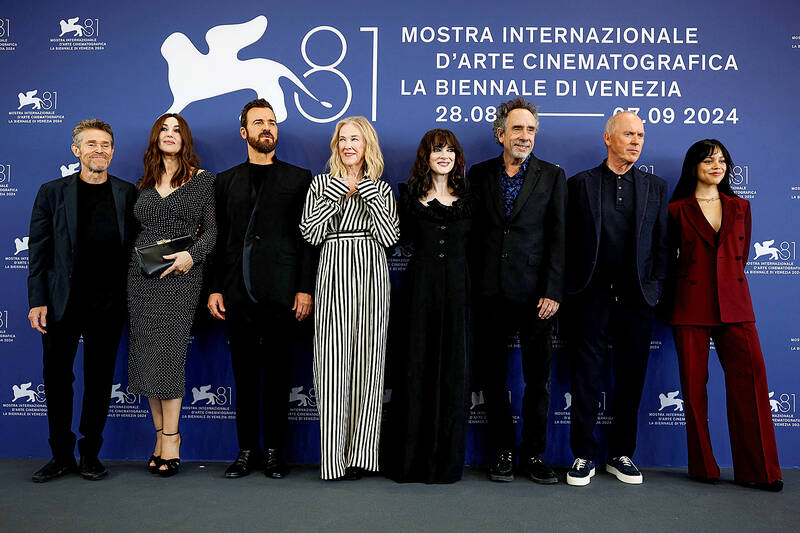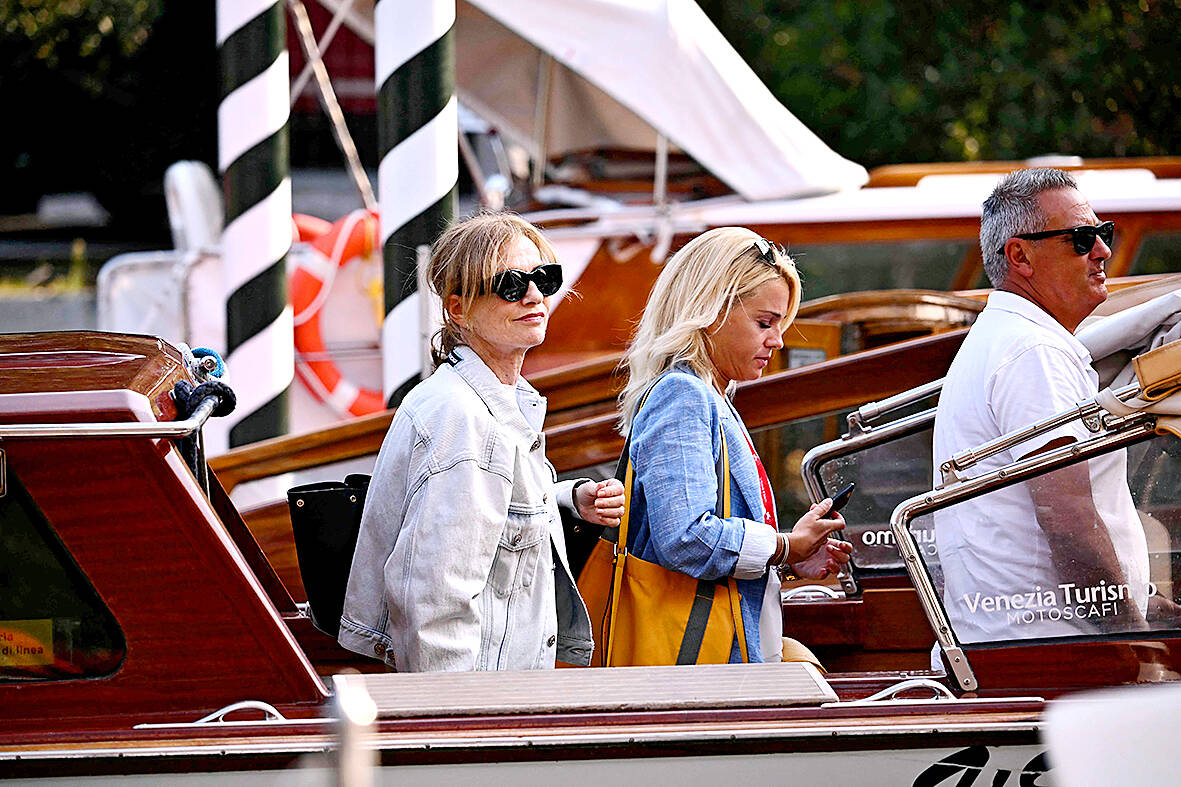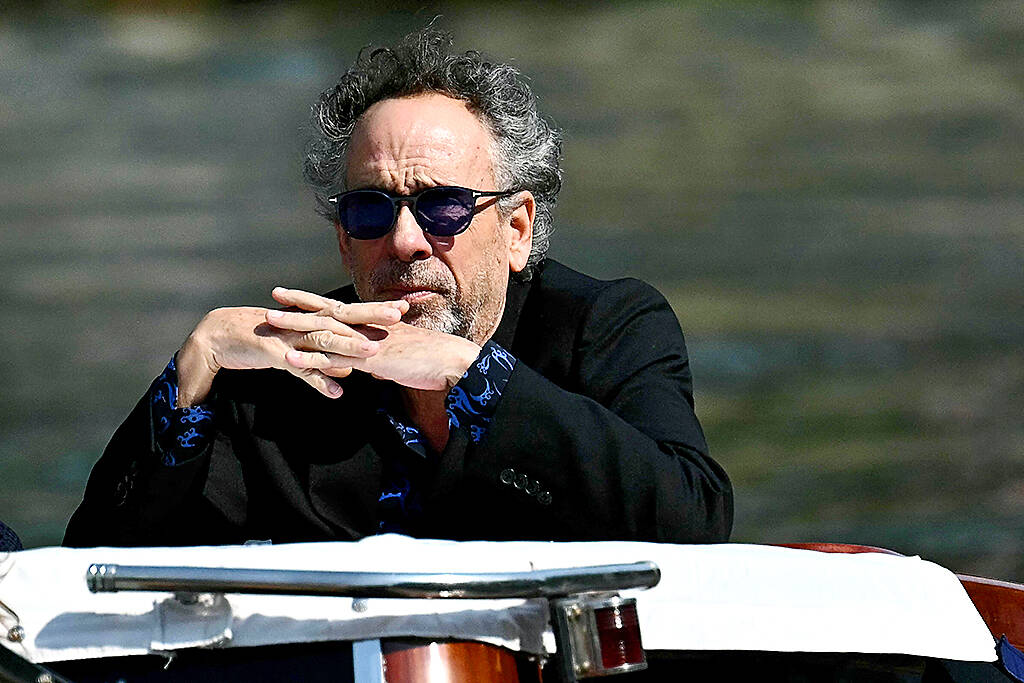The Venice Film Festival kicked off yesterday with a devilish debut of Tim Burton’s Beetlejuice sequel and a surge of star power for the glitzy competition on the sun-splashed Lido.
Lady Gaga, George Clooney, Daniel Craig, Julianne Moore and Brad Pitt are among the A-listers expected in Italy’s watery city for this year’s edition of the world’s longest-running festival, known as “La Mostra.”
Arriving via water taxi from across the Venetian lagoon for the 10-day event, the celebrities will return some big-budget Hollywood pizzazz to the venerated festival following a low-key edition last year due to the Hollywood strike.

Photo: Reuters
First up is the out-of-competition world premiere of Beetlejuice Beetlejuice, featuring Michael Keaton as the chaos-causing ghoul alongside Winona Ryder, Catherine O’Hara and Monica Bellucci.
Today, all eyes are on Angelina Jolie, making a star turn as Maria Callas in Maria, Pablo Larrain’s biopic about the opera diva’s tormented life.
It is among 21 international films vying for the top Golden Lion prize to be awarded Sept. 7.

“There hasn’t been such a consistent presence of star actors from so many countries perhaps for more than 20 years,” festival director Alberto Barbera said, adding that their presence “can only do good” to bring attention to films.
Much anticipated is the dark psychological thriller Joker: Folie a Deux, the sequel to US director Todd Phillips’ 2019 Venice-winning film loosely based on the DC Comics characters and set in a gritty Gotham City.
The sequel brings back Joaquin Phoenix, who won an Academy Award for his depiction of the failed clown descending into mental illness, this time paired with Lady Gaga as his sidekick and love interest Harley Quinn.

Photo: EPA-EFE
Daniel Craig stars in Queer from Italy’s Luca Guadagnino, an adaptation of the William Burroughs novel set in 1940s Mexico City, while Australian director Justin Kurzel’s The Order features Jude Law as an FBI agent investigating white supremacy in the Pacific Northwest.
Venice regular Pedro Almodovar, of Spain, is back with his first full-length film in English, The Room Next Door, with Moore and Tilda Swinton.
Nicole Kidman stars with Antonio Banderas in the erotic thriller Babygirl from Dutch director Halina Reijn, about a powerful woman CEO who embarks on a torrid affair with a much-younger male intern.

Photo: AFP
The roster also includes US director Brady Corbet’s The Brutalist, featuring Adrien Brody as a Hungarian Jewish architect who emigrates to America after World War II and embarks on a project promising to change the course of his life.
WAR, ON SCREEN
Despite the fanfare of the studio films and their stars, the festival still welcomes lesser-known directors and experimental formats, while providing a venue for the exploration of difficult, topical subjects.
The festival includes two documentaries about the Ukraine war, with Songs of Slow Burning Earth by Ukrainian director Olha Zhurba described as an “audiovisual diary of Ukraine’s immersion into the abyss.” Russians at War sees Russian-Canadian filmmaker Anastasia Trofimova embedded with a Russian army battalion in eastern Ukraine, its young soldiers struggling to understand why they are fighting.
Such questions fuel Why War by Israel director Amos Gitai, based on correspondence between two of the 20th century’s brightest minds —Albert Einstein and Sigmund Freud — on the subject of war. Sweden’s Goran Hugo Olsson delved into 30 years of public broadcasting archives for Israel Palestine on Swedish Television 1958-1989, weaving footage from both sides of the ongoing conflict in what the director has called his “most painful film” to date. All four films are playing out of competition.
CULT CLASSIC
With Beetlejuice Beetlejuice, fans of Burton’s dark and oddball cinematic approach get to revisit his 1988 cult classic 36 years later. The director updates the non-conventional family drama centered on protagonist Lydia, played by Ryder, whose teenage daughter (Jenna Ortega) discovers a mystery in the attic, accidentally unleashing mayhem once again on the Deetz household.
Netflix — which has seen great success debuting its films on the Lido before their small-screen release — is absent this year. Instead, Apple TV+ is presenting Jon Watts’ action comedy Wolfs with Pitt and Clooney playing rival professional fixers, and thriller series Disclaimer with Cate Blanchett, Kevin Kline and Sacha Baron Cohen.
During yesterday’s opening ceremony, Alien star Sigourney Weaver received an honorary Golden Lion for lifetime achievement.

This year will go down in the history books. Taiwan faces enormous turmoil and uncertainty in the coming months. Which political parties are in a good position to handle big changes? All of the main parties are beset with challenges. Taking stock, this column examined the Taiwan People’s Party (TPP) (“Huang Kuo-chang’s choking the life out of the TPP,” May 28, page 12), the Democratic Progressive Party (DPP) (“Challenges amid choppy waters for the DPP,” June 14, page 12) and the Chinese Nationalist Party (KMT) (“KMT struggles to seize opportunities as ‘interesting times’ loom,” June 20, page 11). Times like these can

June 23 to June 29 After capturing the walled city of Hsinchu on June 22, 1895, the Japanese hoped to quickly push south and seize control of Taiwan’s entire west coast — but their advance was stalled for more than a month. Not only did local Hakka fighters continue to cause them headaches, resistance forces even attempted to retake the city three times. “We had planned to occupy Anping (Tainan) and Takao (Kaohsiung) as soon as possible, but ever since we took Hsinchu, nearby bandits proclaiming to be ‘righteous people’ (義民) have been destroying train tracks and electrical cables, and gathering in villages

Dr. Y. Tony Yang, Associate Dean of Health Policy and Population Science at George Washington University, argued last week in a piece for the Taipei Times about former president Ma Ying-jeou (馬英九) leading a student delegation to the People’s Republic of China (PRC) that, “The real question is not whether Ma’s visit helps or hurts Taiwan — it is why Taiwan lacks a sophisticated, multi-track approach to one of the most complex geopolitical relationships in the world” (“Ma’s Visit, DPP’s Blind Spot,” June 18, page 8). Yang contends that the Democratic Progressive Party (DPP) has a blind spot: “By treating any

Swooping low over the banks of a Nile River tributary, an aid flight run by retired American military officers released a stream of food-stuffed sacks over a town emptied by fighting in South Sudan, a country wracked by conflict. Last week’s air drop was the latest in a controversial development — private contracting firms led by former US intelligence officers and military veterans delivering aid to some of the world’s deadliest conflict zones, in operations organized with governments that are combatants in the conflicts. The moves are roiling the global aid community, which warns of a more militarized, politicized and profit-seeking trend